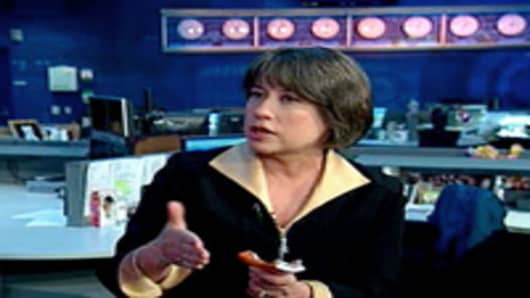Steve Rattner’s savaging of FDIC chair Sheila Bair should damage Rattner’s reputation more than Bair’s. Rattner comes off as something worse than an arrogant and entitled commissar—he appears to be profoundly opposed to the structure of the American government.
There’s a long excerpt from Rattner’s book, Overhaul, over at Economics of Contempt. Rattner— the former 'car czar' for Obama—makes it clear that he does not have much respect for Bair, referring to her as a “Kansas lawyer”and unfavorably comparing her academic career to Ben Bernanke’s.
Worse, she once ran for Congress and was appointed by George Bush. She has “an unsmiling, sour demeanor.” Her FDIC is described as “muttering about new capital” for GMAC.
Points go to Rattner for candidness, I suppose. But there’s something inappropriate about his attitude toward her. Keep in mind that Bair was appointed to a decades old independent agency to a position which required confirmation by the U.S. Senate. Rattner was simply part of Obama’s kitchen cabinet, approved by no one except maybe Rahm Emmanuel. Some sort of deference to her rank should be expected.
In fact, Rattner seems angry that Bair wouldn’t defer more to him. The excerpt seethes with contempt for the independence of the FDIC, describing Bair’s attempts to shore up the financing of her agency as “obstructionist.”
Here’s Rattner on Bair trying to make sure that the administration will back her attempts to secure more government support for the FDIC:
So the FDIC withheld its approvals, muttering about more capital. Making things worse, Spoth hinted at but would not spell out his boss’s demands. We made so little progress with him that I finally asked Tim to intercede. A summit meeting was booked for April 28, just two days before the President was to speak on television. It was in Tim’s small conference room, in the early evening of another unseasonably warm day, that I first came face-to-face with Sheila Bair—a small, trim woman about my age with brown hair, brown eyes, and an unsmiling, sour demeanor. According to Washington protocol, this was a “principals plus one” meeting. Sheila brought Spoth. Tim and I represented Treasury, leaving me without my finco experts Brian and Rob. Bernanke and Alvarez participated by phone.
One could hear bemusement in Bernanke’s soft voice coming through the speaker. His tone suggested that he was wondering, “Why are we even here?” The Fed was already prepared to meet a key demand by Bair, that GMAC be able to use dealer loans as collateral to borrow at the Fed’s “discount window.” But this meeting was about Bair’s needs. An effort was under way in Congress to increase from $30 billion to $100 billion the credit line at Treasury used by the FDIC to backstop its deposit-insurance fund. Bair made it clear that in exchange for helping GMAC, she expected Treasury’s support for the legislation. Such horse-trading is routine, and I didn’t question it. I just wished that she or Spoth had been more straightforward and had brought it up weeks earlier. But Tim readily acquiesced.
This seems like the actions of a prudent regulator. Unlike the bemused Bernanke, Bair cannot simply order the U.S. government print money to fund her operations. In 2009, there were serious questions about whether the massive volume of bank failures would overwhelm the FDIC and require a government bailout. Refusing to allow GMAC to take on more liabilities—which could put its FDIC guaranteed accounts at risk—without a guarantee of administrative support for an expanded FDIC credit line was a very good idea. But to Rattner this is just “horse trading.”
In the end, Rattner and the Obama administration go ahead with their plans for a further auto sector bailout without FDIC approval. Rattner shows no signs that he views this as a dangerously maverick and divisive move. It never seems to give him pause that he is subverting the structure of the Constitution by carrying on with a bailout that was voted down on Capitol Hill and did not have the cooperation of one of three Senate approved bureaucrats—Bernanke and Treasury Secretary Tim Geithner were the other two—who he admits he needed to complete the GMAC deal.
Rattner once described his Car CZAR role as similar to running a private equity firm. "You take a company, you analyze it inside and out, you break down all its components, you evaluate the management, you evaluate its competitive position—and you decide whether to invest in it or not," he said.
But Rattner wasn't deciding to invest his own capital or those of his investors. He was deciding to invest the capital of the US government, which is to say he was foisting an involuntary and unpopular bailout on the US taxpayer. The very phrase "and you decide whether to invest in it or not" reeks of anti-democratic hubris. "You decide" Steve? So much for the legislative branch's spending power. So much for the authority of constitutionally approved executive officers.
Economics of Contempt notes that he has “always been surprised that Bair managed to become something of a hero among progressives.” I’d suggest that this Rattner excerpt explains this very well. In an era when government officials seemed to willing to open the public coffers to giant corporations on questionable readings of vague laws, Bair wasn’t always willing to play along. Her autonomy may have made the activities of the Steve Rattners of the world more difficult—but that’s why so many people like her.
Questions? Comments? Email us atNetNet@cnbc.com
Follow John on Twitter @ twitter.com/Carney
Follow NetNet on Twitter @ twitter.com/CNBCnetnet
Facebook us @ www.facebook.com/NetNetCNBC



